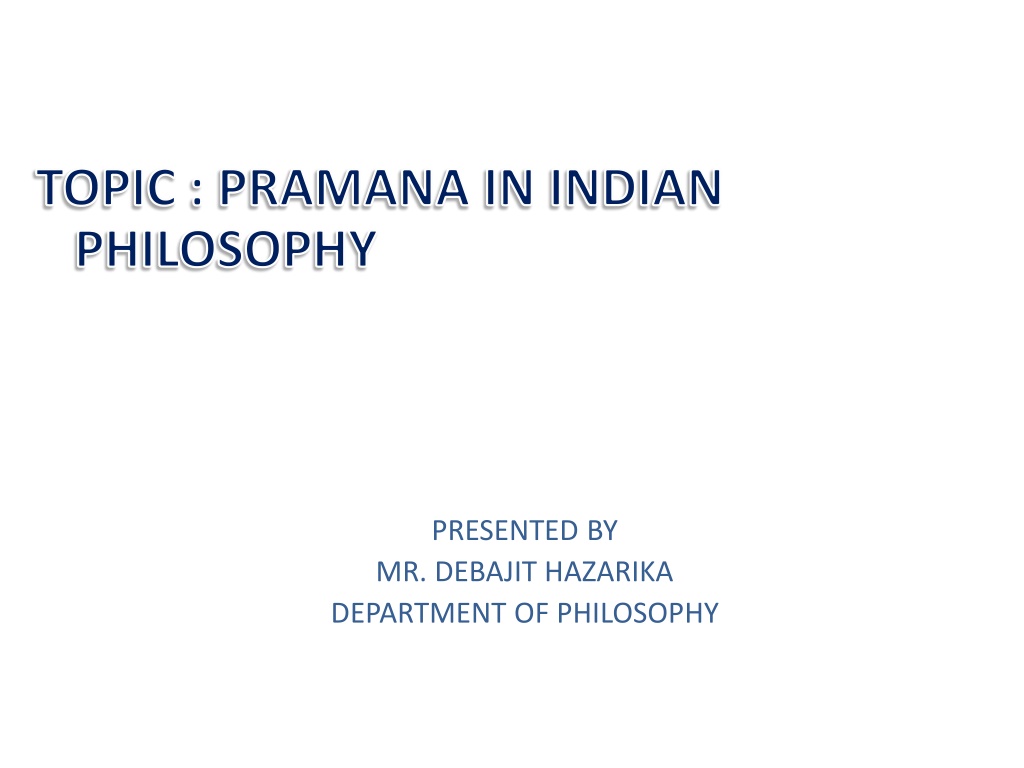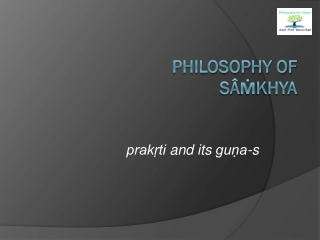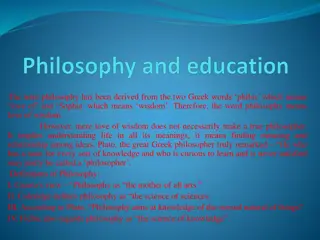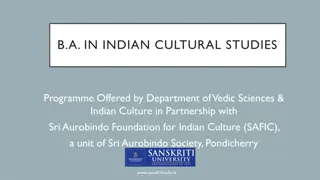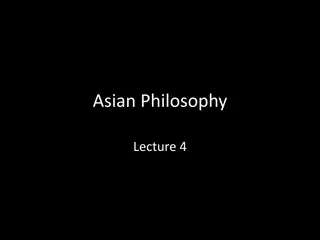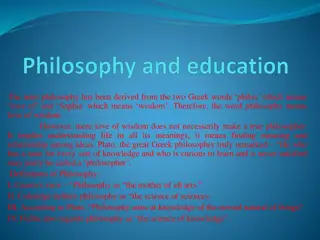Understanding Pramana in Indian Philosophy by Mr. Debajit Hazarika
Philosophy delves into the quest for knowledge, with Epistemology exploring sources and validity. In Indian philosophy, Prama signifies true cognition, attainable through Pramana - the means to achieve valid knowledge. This discussion covers the six pramanas within various philosophical systems and the classification of knowledge based on Jnana. The sources of valid knowledge, such as Pratyaksa (Perception) and Anumana (Inference), are also elaborated upon.
Download Presentation

Please find below an Image/Link to download the presentation.
The content on the website is provided AS IS for your information and personal use only. It may not be sold, licensed, or shared on other websites without obtaining consent from the author. Download presentation by click this link. If you encounter any issues during the download, it is possible that the publisher has removed the file from their server.
E N D
Presentation Transcript
TOPIC : PRAMANA IN INDIAN PHILOSOPHY PRESENTED BY MR. DEBAJIT HAZARIKA DEPARTMENT OF PHILOSOPHY
INTRODUCTION Philosophy is an incessant search after knowledge. Epistemology is the branch of philosophy which discuss the sources, conditions and validity of knowledge. Knowledge means apprehension or cognition of an object or fact. In Indian philosophy true cognition is known as Prama. Prama means the valid knowledge which is free from doubt and falsity. Pramana is the means or ways of attaining valid knowledge or prama. In the absence of pramana no valid knowledge can be achieved.
PRAMANAS In Indian Philosophy there are six ways of valid knowledge or pramanas, The schools of Indian Philosophy synthesis the all branches of philosophy as whole. The pramanas can be discussed regarding the schools as follows: PHILOSOPHICAL SYSTEMS PRAMANAS 1. CARVAKA 1. PRATYAKSA 2 BUDDHISM 1. PRATYAKSA 2. ANUMANA 3. VAISESIKA 1. . PRATYAKSA 2. ANUMANA 4. JAINA 1. PRATYAKSA 2. ANUMANA 3. SABDA 5. SAMKHYA 1. PRATYAKSA 2. ANUMANA, 3.SABDA 6. YOGA 1. PRATYAKSA 2. ANUMANA, 3.SABDA 7. NYAYA 1. PRATYAKSA 2. ANUMANA, 3. SABDA, 4. UPAMANA 8. MIMAMSA PRABHAKARA- 1. PRATYAKSA 2. ANUMANA 3. SABDA, 4. UPAMANA, 5. ARTHAPATTI, KUMARILA BHATTA-1. PRATYAKSA 2. ANUMANA 3. SABDA, 4. UPAMANA, 5. ARTHAPATTI, 6. ANUPALABDHI. 9. VEDANTA ADVAITINS- 1. PRATYAKSA 2. ANUMANA, 3. SABDA, 4. UPAMANA, 5. ARTHAPATTI, 6. ANUPALABDHI. VISISTADVAITINS- 1. PRATYAKSA 2. ANUMANA 3. SABDA
CLASSIFICATION OF KNOWLEDGE /JNANA JNANA/ KNOWLEDGE SMRITI/ MEMORY ANUBHAVA/ PRESENTATION 1. YATHARTHA/ VALID 2. AYATHARTHA/ INVALID ANUBHAVA/ PRESENTATION PRAMA/VALID KNOWLEDGE APRAMA 1. PRATYAKSA/PERCEPTION 1. SAMKHAY/DOUBT 2. ANUMANA /INFERENCE 2. VIPARYAYA /ERROR 3. UPAMANA/ COMPARISON 3. TARKA /HYPOTHETICAL REASONING 4. SABDA /TESTIMONY
In the following there is an attempt to discussed about the sources of valid knowledge distinctly- a)Pratyaksa/Perception : All The schools of Indian philosophy admits perception/pratyaksa as a source of valid knowledge or prama. There are different views regarding the nature and meaning og pratyaksa. From the etymological point of view pratyaksa means dierct knowledge or saksyat jnana . Perception is defined as knowledge which arises by contact of sens organ with object. For example- we perceived a table.Here,a contact between eyes and the object table.
b)Anumana/Inference: Anumana or Inference is defined as mediate knowledge, which presupposes some other knowledge. Anumana is a Sanskrit term which consists of two parts Anu and Mana , which means after a knowledge and reapectively. Etymologically Anumana means knowledge which follows from some other knowledge. For example- By perceiving smoke we can infer presence of fire.
c)Sabda/Testimony: Sabda means the speech of reliable person or statement of trustworthy text. Gautama the founder of Nyaya defined Sabda as Aptupadesahah Sabda . For example-According to Vedas Varuna is the custodian of Rta.
d) Upamana/Comparision: unknown object trough its resemblance with another well known object. For example-the statement, a wild cow (Gavaya) is like a cow , It is an well known object. The person perceived in the forest a strange animal like a cow and he get the knowledge of Gavaya. Upamana is the means of knowing and
e) Arthapatti/ Postulation: Arthapatti is coming from two words artha and apatti , artha means subject and appatti means imagination . Therefore etymologically arthapatti means assumption/ supposition of an unperceived facts without which consistency among perceived facts cannot be reconciled. For e,g We know that Hari is alive and perceive that he is absent in his home, so we assume his existence outside of his home.
f) Anupalabdhi/ Non- Apprehension: Anupalabdhi is the sixth ways of valid knowledge accepted by Mimamsa Philosopher Kumarila Bhatta and Advaita Vedantins. It means knowing the non existence of an object. For e.g. The non existence of curd in milk; The non existence of water in the pot.
